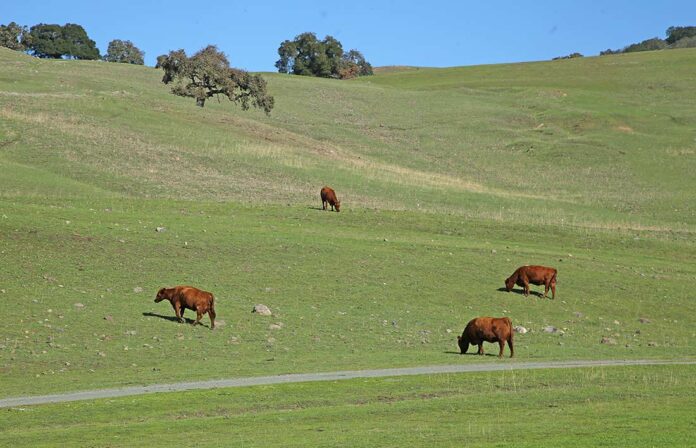The County of Santa Clara has launched a program that will allow ranchers and livestock owners to access restricted areas during wildfires and other emergencies to feed their animals, check their health and, if necessary, evacuate them.
The County has granted more than 40 Livestock Passes so far to ranchers who have participated in a mandatory Cal Fire training regarding fire safety. The Livestock Pass Program (LPP), approved by the Board of Supervisors in July, is the County’s implementation of Assembly Bill 1103, signed into law in October 2021.
The program grants limited emergency access to livestock owners and managers so they can get past roadblocks and visit the ranches and fields where their animals are sheltering in place. Roads are often closed surrounding wildfires to protect public safety and prevent interference with firefighting operations.
“Ranchers are a vital part of our community, and they live and work in areas that are at high risk for wildfires,” said Supervisor Mike Wasserman, whose First District includes most of the county’s 253,893 acres of rangeland. “This program gives them the ability to care for their animals and safeguard their businesses while also keeping the public safe and allowing firefighters to do their jobs.”
Supervisor Joe Simitian said the Livestock Pass Program demonstrates the value the State and County place on emergency preparedness.
“Whether it’s a wildfire, an earthquake or some other form of natural disaster, we need to be prepared,” Simitian said. “We have to give local communities the tools they need to keep their livestock and livelihoods safe. Unfortunately, we know this will be an issue in the months and years ahead.”
Climate change has increased the risk and prevalence of destructive wildfires in California. The eight largest fires in modern California history have occurred since 2017, according to Cal Fire.
“I saw firsthand during the 2020 SCU Lightning Complex Fires the impact of wildfires on livestock producers,” said Joe Deviney, the County’s Agricultural Commissioner. “This program will save the lives of animals and protect the livelihoods of our ranchers.”
Possession of a Livestock Pass does not guarantee access to areas that have been evacuated or restricted. Emergency personnel have the discretion to grant or deny access depending on conditions. The pass may not be used for anything other than caring for livestock, such as checking on pets or collecting household items.
Brian Glass, Assistant Fire Chief of the Santa Clara County Fire Department, said it’s important to provide training to ranchers, because returning to a fire area before it has been reopened to the public can present a broad range of hazards.
“Participating in the Santa Clara County Livestock Pass Program before a wildfire starts is critical to providing access and safety for our ranchers,” Glass said. “While every fire is unique, and possession of an LPP card does not guarantee access to a closed area, the program provides livestock owners with identification and training necessary to expedite access to care for and feed livestock in areas otherwise unavailable to the public.”
Livestock Passes are limited to commercial producers who own at least 20 head of livestock such as cattle, sheep, goats and honeybee hives that reside in Santa Clara County for at least part of the year. The passes must be renewed every two years.
Robert Bianchi, who runs a cattle ranch in the foothills of Gilroy along with his wife, Chris, and daughter, Erica, is among the ranchers who have successfully applied for a pass.
Cattle can last only a few days without food and water, said Bianchi. Their newborn calves are particularly vulnerable during a wildfire.
“The Livestock Pass is really important to us,” Bianchi said. “The cattle business is what we do for a living. If a wildfire came through and we couldn’t take care of our animals, we could lose everything.”
Ranchers play essential roles in the county’s environment and economy, as detailed in the 2021 County of Santa Clara Crop Report. Rangeland is the largest land use in Santa Clara County.
More information on the Livestock Pass Program, including an online application, is available on the County’s Livestock Pass Program website.















